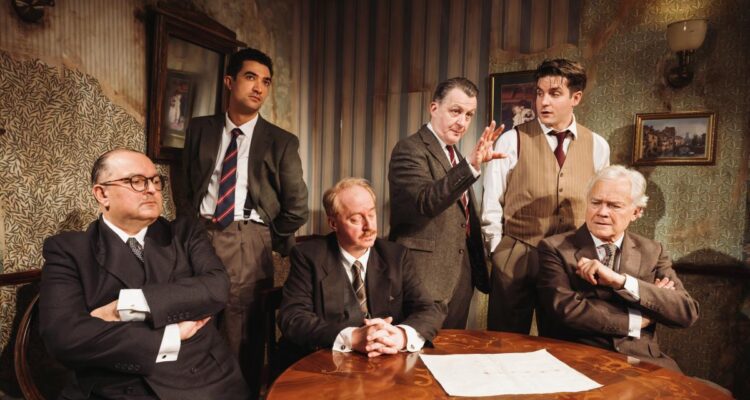Katherine Moar’s Farm Hall is a timely play in the age of Oppenheimer. It is based on the secretly recorded transcripts of Farm Hall where the leading lights of Nazi Germany’s nuclear programme were interned for six months, between 1945 and 1946. They were Otto Hahn, Werner Heisenberg, his student Erich Bagge, Max von Laue, Carl Friedrich von Weizsäcker, and Kurt Diebner. Most of them had been at the forefront of nuclear physics research well before the Nazis swept to power in 1933. They sat out the regime’s hijacking of Germany and thus found themselves working to the orders of a pariah government. In retrospect one has to be grateful that some of the greatest Jewish physicists left for Britain and the US. Had the likes of Edward Teller and Albert Einstein stayed on in Germany, the Nazis might have got there first. In which case the world would have entered the darkest age imaginable. As it is, Hitler was keener on rockets than nuclear fission. It is also just possible that Germany lacked the resources that the USA invested in the top-secret Manhattan Project, which produced the first atom bomb.
When the play opens, the six German scientists are cocooned at Farm Hall, a somewhat shabby country house near Cambridge. They are rehearsing a play – why not go native completely and play charades – and of course they soon start bickering out of sheer boredom. The play is shot through with sub-Shavian banter and barbs, as one might expect from some of the world’s most brilliant scientists. After all, here they are, Nobel laureate-calibre physicists with, for challenges, at best a piano in need of tuning and a single chessboard. Of course they reflect on their very recent past. How implicated were they, how anxious were they to climb the greasy pole, even at the cost of kowtowing to a criminal regime? Should Heisenberg feel guilty because his family knew Himmler, a name that had already become a byword for mass murder? As it happens, Heisenberg brushes off the surmised moral contamination of his family. Similarly, two others of the men had links to the regime, through party membership.
The first half of the play consists of setting the past scene and, surprisingly, exploring the men’s sense of their future in post-War Germany. On the one hand they would dearly love to disown any sympathy with the Third Reich, to enhance their standing with the Allied powers. They are doing so by implying that they quietly slowed down the Nazi nuclear programmes. Not ‘sabotaged’, because that would show them up as ‘traitors’ on their return to Germany. To the extent that they are confident about returning home, the six physicists are presented here through a retrospective lens. Admittedly at some point they wonder whether the Allies may make them crash in a plane. But they also somehow know that that will not happen. At the end of the play they leave: they are indeed heading home just as they did in real life. Within a very short time they were back in prestigious research posts in Germany.
The first act ends with news breaking, on the BBC, of the Hiroshima bomb. The six freeze: how, they wonder, did the Americans do it, and what were their own roles in creating this terrible new weapon? At this point Otto Hahn emerges briefly as the collective conscience of the men. As much as Oppenheimer’s, it was his research that launched the monster that now haunts all of us, and will do so until the end of time. And should nuclear weapons ever be used that will be the end of time. Throughout the play is neatly balanced and resists all sentimentality. These men worked for an ineffably wicked regime and built careers inside its criminal structures. They are not let off the hook, which makes it hard to empathise with them. The performances are impeccable. Given the apocalyptic context of Farm Hall it may not be the most enjoyable evening out, but the play is genuinely instructive in a Brechtian Galileo way. It will make you think.
Until: Saturday 31 August 2024
Running time: 1 hours and 45 minutes including a 20 minute interval.
By Katherine Moar
Directed by Stephen Unwin
Cast includes: Daniel Boyd, David Yelland, Alan Cox, Julius D’Silva, Archie Backhouse, Forbes Masson
Photo credit Alex Brenne

